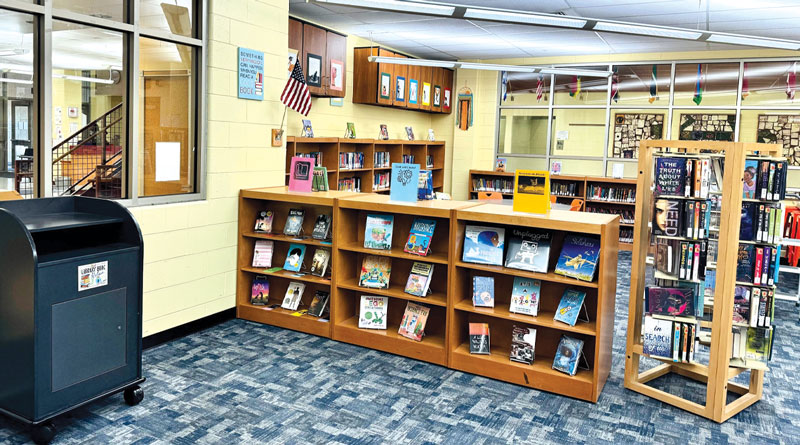Meeting the Library Needs of English Language Learners and Changing Reading Culture
Leigh Knapp made collection development decisions focused on improving the reading skills of the refugee population at her Milwaukee elementary school and helping the students acclimate to their new surroundings.
 |
Leigh Knapp’s library at Bethune AcademyCourtesy of Leigh Knapp |
The students of Bethune Academy reflect the larger population of their Milwaukee, WI, community: The PreK–8 school is home to a large refugee population from countries such as Myanmar and Malaysia, and many students are raised in households that speak Burmese, Rohingya, or Karen. Around 40 percent of the school’s students are English Language Learners (ELLs), which is a key factor in how they engage with the school library. In the past, though, they had limited opportunity to benefit from its resources.
Before this year, Bethune Academy’s library was only open twice a week. On those days, 20 classes divided the limited time. Classes shuffled in, scouted books to check out, and ceded to the next class before the students could explore the resources or get the lay of the land.
Enter Leigh Knapp, who recognized the library’s shortcomings in reaching the students while working as the school’s support teacher. After starting the process of earning her librarian certification, she saw greater possibilities.
“With everything I was learning through my library coursework, I started to have big dreams of what I could do.”
This past school year, Knapp became Bethune’s first full-time library media specialist, targeting the specific needs of her students, including the ELL population.
At times, traditional titles that seem age-appropriate for students might be above the actual reading levels of ELL students. To address this breach, Knapp has increased the library’s selection of graphic novels and manga, which are especially popular with elementary students and are an easy point of entry for students, who can follow a story without being overwhelmed by extensive vocabulary. She noted that the demand for graphic novels also prevented ELL students from feeling alienated from their peers—instead of reading books that were meant for younger children, these students read the same books as their friends, which eases the intimidation around reading while learning English. Knapp notes, for example, a seventh grade girl who was new to the country last year and had not picked up much English. Still, “because of these other texts that are available, she can still get some of the books that other kids her age are getting.”
Knapp also aimed to represent the students’ lived experiences through the titles she offered. Upon becoming the library media specialist, she completely reorganized the library’s collection, adding over 1,000 new titles and making sure to display books that the children could relate to—stories that highlight people of color, children of different nationalities, and refugee perspectives.
“That doesn’t mean you don’t want to have books that expose you to someone else’s way of life,” Knapp says. “But you want to be able to see yourself.”
The efforts to make Bethune’s library more accessible to its students led to greater engagement with the library throughout the entire school. With the library now open every weekday, students began to engage with literary resources more than ever.
Since Knapp became the library media specialist, the library’s circulation increased more than 500 percent, with the number of books checked out in the 2024–25 school year surpassing the last seven years combined.
In addition to encouraging Bethune’s ELL students, Knapp organized a schoolwide reading challenge through Beanstack. Students logged the number of minutes they read each day, and classes competed against each other. The class and student in each class that read the most were the winners. In addition, for every 30 minutes a student read, they earned a ticket for a weekly raffle run by the library. The school also had a community reading goal, which, if met, would earn everyone a movie/popcorn night.
For the school’s most serious readers, the school participates in Battle of the Books, Wisconsin’s statewide reading challenge. Instead of measuring progress through minutes read, students must read a slate of books selected by the organization and answer questions about them. The club as a whole is assigned approximately 20 books, with each member being the "expert" on four of five of them. Last school year, Bethune's team had more than 30 students. While that is a small portion of he school's student body, it marks discernible progress in the school's reading environment, Knapp says. By focusing her library programming on collective activities, Knapp has shown her students that reading does not have to be a solitary endeavor.
Through engaging with reading outside of school, Bethune’s students have shown stronger language skills. The impact of this change and additions to the collection are not just conjecture—since Knapp became the library media specialist, 10 percent more Bethune students tested above targeted levels in reading assessments.
Caroline Nieto is a junior majoring in English at Columbia University.
RELATED
The job outlook in 2030: Librarians will be in demand
The job outlook in 2030: Librarians will be in demand
ALREADY A SUBSCRIBER? LOG IN
We are currently offering this content for free. Sign up now to activate your personal profile, where you can save articles for future viewing






Add Comment :-
Be the first reader to comment.
Comment Policy:
Comment should not be empty !!!